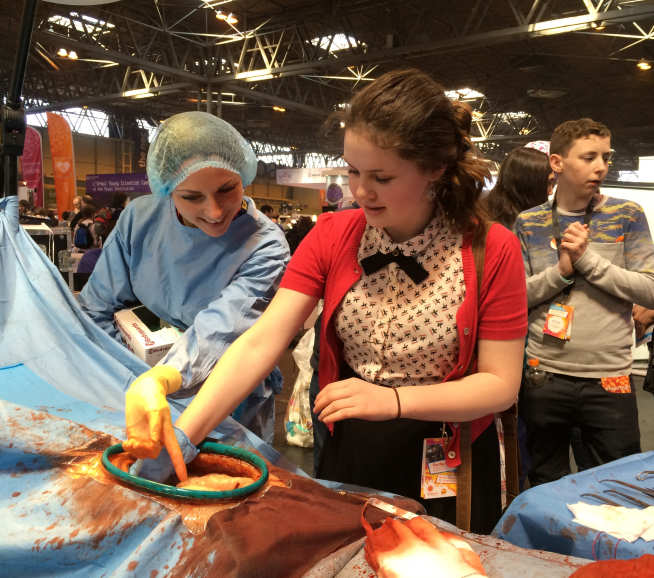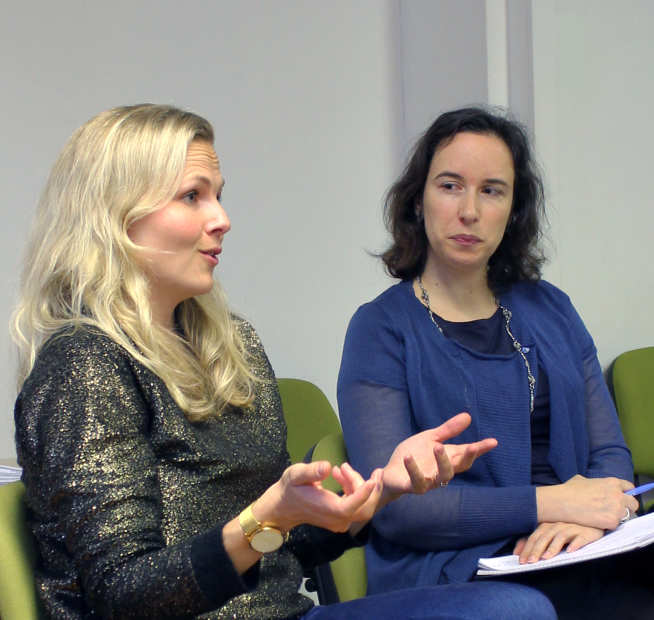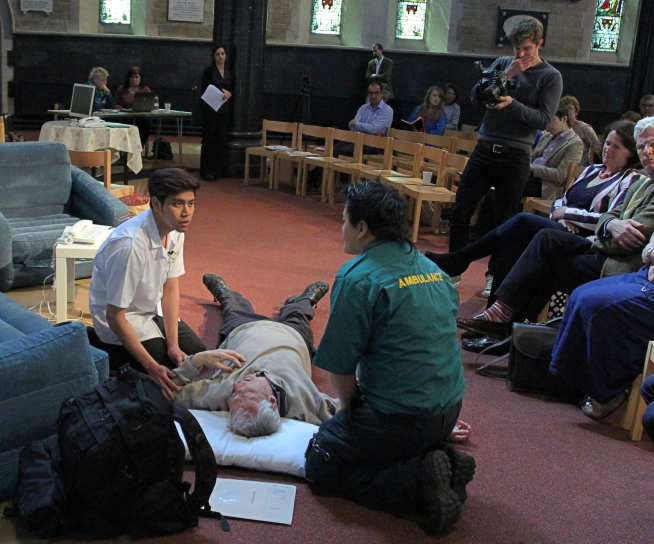Engagement
Engagement connects professionals with patients and publics, enabling them to share perspectives. A respectful and constructive exchange of viewpoints acknowledges the expertise which everyone brings and values the reciprocal illumination which results.
Engagement is a powerful way of connecting clinical problems with possible solutions, and matching scientific discoveries with potential applications. At ICCESS we research this process, gathering evidence on how people learn from one another. Our focus is on health, illness and the scientific breakthroughs of the future.
We use simulation to provide vivid examples of clinical care, such as an operating theatre or intensive care unit. This allows us to show medical procedures and systems without risking harm to actual patients.
Education
Our work involves education of many kinds, from training surgeons and medical students to creating outreach activities with primary school children. In each case we share our passion for widening knowledge and learning more about the people we work with.
Simulation allows us to share an understanding of what clinical professionals do - the procedures they perform, the ways they work together, the problems they face - by inviting people to watch and take part in those activities themselves. This powerful approach is opening new ways of understanding the worlds of medicine and biomedical science.
Research objectives
- To understand how simulation can be used as a tool to engage and educate
- To learn how to design simulations in response to real-world clinical and scientific challenges
- To harness insights from professionals, patients and publics to improve the health of all
- To develop, implement and evaluate innovative approaches to medical and surgical education
Examples of our engagement activities
Public engagement

Our early work designed simulation for training clinicians. Over time we realised that simulation provided a means of showing the public what happens inside a world they seldom see - the operating theatre. Our development of Distributed Simulation - portable, low cost simulation equipment - gave us the ability to take surgical simulation out of the lab and in front of a wider audience.
Since then ICCESS has delivered over 120 public engagement events, running simulations at museums, music festivals, and even public parks. We've moved on from doing purely surgical simulations too, with events that showcase our haptic interfaces, such as our participation in Eurohaptics 2016, a major European conference on haptic technology hosted by Imperial College London.
Patient Engagement

Our experience in presenting medical simulation to the wider public showed us that simulation could be about more than showing what happens within the closed world of surgery and medicine. We are now developing simulations for specific clinical procedures, inviting relevant patient groups to contribute their perspectives on how care is provided now and how things could be made even better.
The ability of simulation to test proposed changes to systems of care offers powerful opportunities for placing patients at the centre of the process. Simulation-based engagement for improving patient experience has become a key focus of our work. In 2016, in partnership with Imperial College Healthcare Charity, we established the St Mary's Patient Experience Hub to explore the use of simulation to improve patient experience at St Mary's Hospital in London.
Find out more about the St Mary's Patient Experience Hub.
Engagement for System redesign within the NHS

In 2015 we collaborated with a Clinical Commissioning Group (CCG) in London to develop a new integrated healthcare model, using our concept of Sequential Simulation to re-enact the journeys of several patients through the local healthcare system. The scenarios, based on actual patient experiences, depicted situations where the different services involved in patient care had failed to work together effectively.
After watching each simulation, the audience - CCG management, clinicians, patient representatives, social services and other key stakeholders - were led through a series of facilitated discussions to identify what worked well, what didn't work well and what could be improved. We used this to design a new, improved care model which was 'played back' to the same audience at a follow-up event, and further discussion around refinement of the model took place.
The CCG used the outcomes of the project to inform the design of their new integrated care model. Our evaluation showed that patients and other groups felt that they had made an important contribution to the new model of care.
Engagement with experts outside of medicine
Working with threads
Collaboration with experts outside the world of medicine is a key area of our engagement activity. Over the last few years we have collaborated with tailors, magicians, craftspeople, artists and many more, exploring parallels between their work and areas of clinical practice. This provides an insight into the range of skills required by surgeons, such as manual dexterity and teamwork. We are also exploring how these different kinds of expertise can contribute to the education of healthcare professionals.
Countercurrent: conversations with Professor Roger Kneebone
ICCESS Director Prof Roger Kneebone's Countercurrent series of podcasts features him in conversation with people whose careers have been unusual or inspiring, and whose interests transect traditional boundaries. Click here to access the podcasts on iTunes.
Key publications
Tang, J.J., Maroothynaden, J., Bello, F. & Kneebone, R., 2013, Public Engagement Through Shared Immersion: Participating in the Processes of Research, Science Communication , 35, pp. 654-66.
Kneebone, R., 2015, When I say ... reciprocal illumination, Medical education , 49(9), pp. 861-2.
Kneebone, R.L., 2009, Practice, rehearsal, and performance: an approach for simulation- based surgical and procedure training, JAMA , 302(12), pp. 1336-8.
Kneebone, R., Weldon, S.-M. & Bello, F., 2016, Engaging patients and clinicians through simulation: rebalancing the dynamics of care, Advances in Simulation, 1(1), pp. 1-19.
Kneebone, R.L., 2016, Simulation reframed, Advances in Simulation, 1; 27. DOI: 10.1186/s41077-016-0028-8
Kneebone R. Medicine: Discovery through doing, 2017. Nature. 542, 294 (16 February 2017) doi:10.1038/542294a
